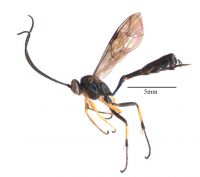ICHNEUMONIDAE: : Venturia Schrottky 1902
Diagnosis:
Characteristics of Venturia include: 1. Body size <10mm; 2. Position of spiracle on 1 of metasoma is clearly behind the centre; 3. Shape of aerolet in forewing is triangulate; 4. Colour of face is only black; 5. Metasoma compressed laterally; 6. Size of ocelli small; 7. Length of antennae is shorter than body; 8. Length of ovipositor is distinct but not longer than body; 9. Wings present; 10. Colour of wings hyaline (clear); 11. Sternaulus absent; 12. Shape of face in lateral view flat or only weakly bulging; 13. Sternite on T1 (viewed laterally) extending past spiracle sometimes forming a long cylinder with tergite; 14. Shape of T1 (viewed laterally) is evenly curved; 15. Number of teeth in mandibles 2; 16. Patterns on metasoma same colour throughout or bicoloured; 17. Length of T1 vs T2 subequal in length; 18. Sculpture on mesoscutum is finely pitted, many hairs; 19. Width of T1 (viewed dorsally) is anterior part slender often parallel, strongly widening behind spiracle; 20. Glymma on T1 absent; 21. Sculpture on metasoma smooth with a semi-glossy or satin appearance at least on T2; 22. Propodeum long (reaching at least halfway along metacoxae).Similarity to Other Taxa
Venturia is a mid-sized Ichneumonid in New Zealand. It is similar in size to: Habronyx , Liotryphron , Phytodietus , Dusona and Lissonota . It can be separated from other similar sized taxa by having the spiracle on T1 is well behind the centre of T1, no glymma, face is all black, distinct ovipositor but not longer than body, aerolet in forewing is triangulate. The propodeum is long (reaching at least halfway along metacoxae).Compare
-

Dusona
Ovipositer very short. -

Habronyx
No areolet in forewing, ovipositer very short, face not all black. -

Liotryphon
The spiracle on T1 is at, before, or close to the centre of T1, T1 short and squat, glymma present, ovipositor as long as body, face not all black. -

Lissonota
The spiracle on T1 is at, before, or close to the centre of T1, glymma present as groove (not deep), ovipositor as long as body, face not all black. -

Phytodietus
The spiracle on T1 is at, before, or close to the centre of T1, a deep glymma on T1, the ovipositor length distinct but not longer than the body, a petiolate areolet in the forewing, face not all black.
Distribution in NZ
North Island: AK, WN. South Island: NN, MC.
Species in NZ
Two species: the endemic Venturia intrudens (Smith, 1878), and V. canescens (Gravenhorst, 1829), which is probably an accidental introduction.Biology & hosts
Venturia is a moderately large genus which mostly occur in the Old World tropics. One species, V. canescens is widely distributed and is common in storage areas associated with grains, where it is a parasitoid of Lepidoptera larvae of many species (Gauld 1984, Yu et al. 2005). The host of Venturia intrudens is not known. They appear to be uncommon.Sources of information
Gauld ID 1984. An Introduction to the Ichneumonidae of Australia. London, British Museum (Natural History). 413 p.Valentine EW & Walker AK. 1991. Annotated Catalogue of New Zealand Hymenoptera. DSIR Plant Protection Report 4. General Printing Services, 84 pp.
Yu DS, van Achterburg K, Horstmann K. 2005. World Ichneumonoidea 2004. Taxonomy, Biology, Morphology and Distribution. CD/DVD. Taxapad. Vancouver, Canada.
Citation
Ward DF & Schnitzler FR. 2013. Ichneumonidae of New Zealand. Genus Venturia http://ichneumonidae.landcareresearch.co.nzAccessed: 26 April 2025


